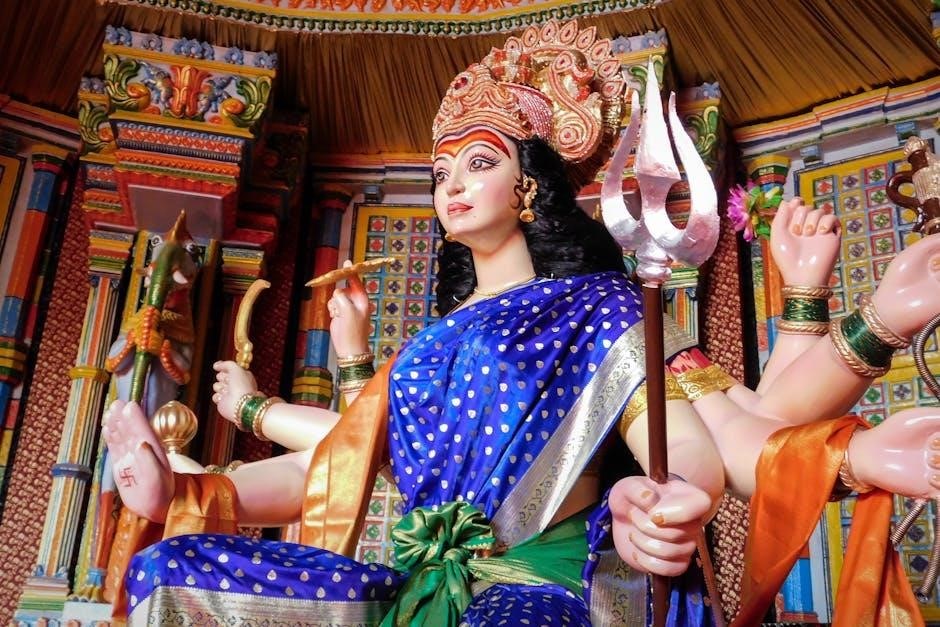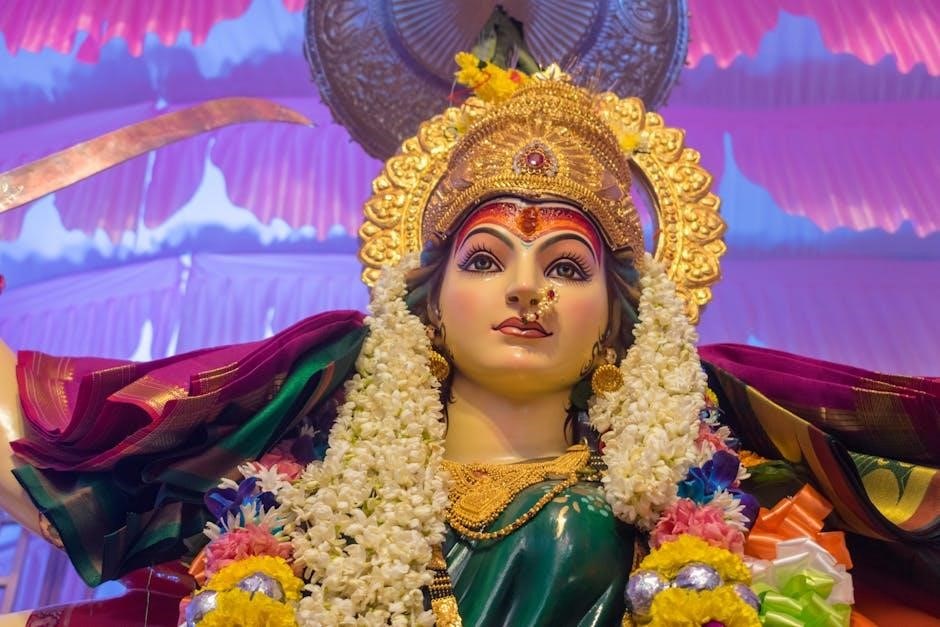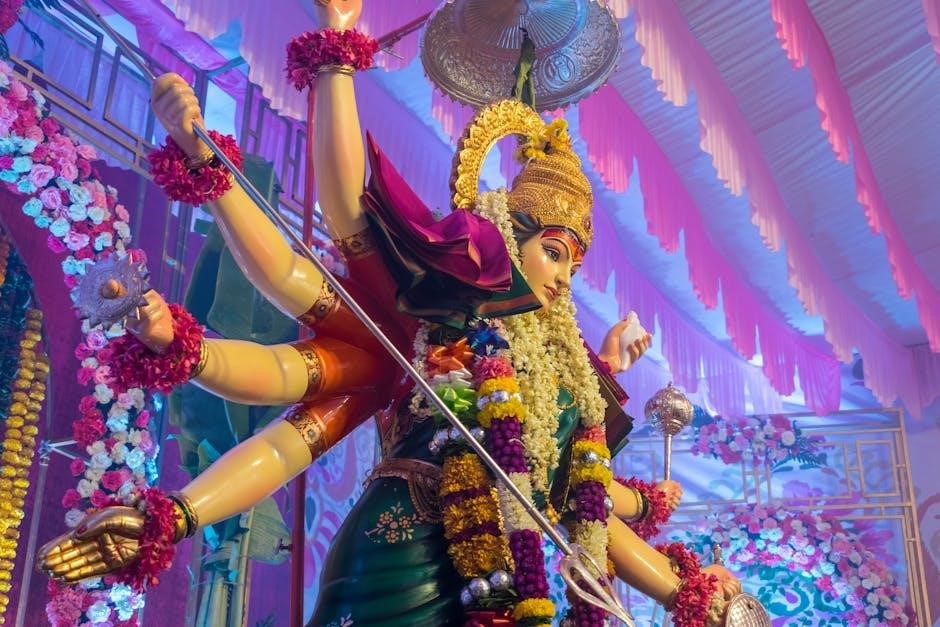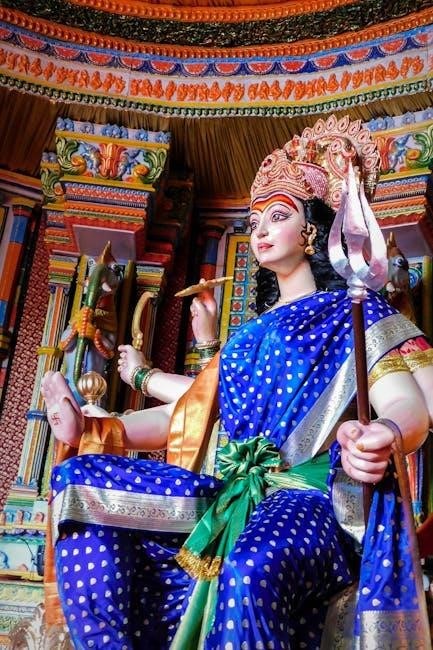devi kavach pdf
Devi Kavach is a sacred hymn from the Devi Mahatmya, offering divine protection and spiritual growth. It is a powerful armor of energy, recited for protection, positive vibes, and self-realization.
What is Devi Kavach?
Devi Kavach, or the “Armour of the Goddess,” is a sacred hymn extracted from the Devi Mahatmya, a revered text in Hindu scripture. It is a powerful recitation that embodies the divine energy of the Goddess, offering protection, strength, and spiritual upliftment to the devotee. Comprising specific verses and mantras, Devi Kavach is believed to create an invisible shield of divine energy around the reciter, warding off negative influences and misfortunes. It is often recited during challenging times or to seek blessings for prosperity and well-being. Rooted in ancient Vedic traditions, this chant is considered a potent tool for connecting with the divine feminine energy, symbolized by Goddess Durga. Its verses are rich in spiritual significance, making it a cornerstone of devotion for those seeking protection, peace, and inner harmony.
Historical Background and Significance
The Devi Kavach is deeply rooted in ancient Hindu scriptures, particularly the Devi Mahatmya, also known as the Durga Saptashati. This text is part of the Markandeya Purana, one of the most revered Puranas in Hinduism. The Kavach is believed to have been composed by Sage Markandeya, who narrated it to glorify Goddess Durga’s divine power and victories over evil forces. Historically, Devi Kavach has been a significant part of Hindu religious practices, especially during Navaratri and Durga Puja, where the Goddess’s triumph is celebrated. Over centuries, it has been passed down through generations, maintaining its spiritual and cultural significance. Its recitation is considered a powerful ritual, offering protection and divine blessings. The hymn’s historical importance lies in its ability to inspire faith and resilience, making it a timeless spiritual practice in Hindu tradition.

The Structure of Devi Kavach
Devi Kavach consists of sacred verses and mantras, forming a protective shield of divine energy. Its structure is organized into specific chapters and hymns, designed to invoke Goddess Durga’s blessings and protection;

Verses and Chapters in Devi Kavach
Devi Kavach is structured into specific chapters and verses, each carrying profound spiritual significance. It is part of the Devi Mahatmya, which contains 700 sacred verses or shlokas. These verses are divided into chapters, each focusing on different aspects of Goddess Durga’s power and protection. The hymn is designed to create a protective shield of divine energy around the reciter, offering spiritual growth and safety. Key sections include the Devi Suktam, found in Chapter 8, verses 7 to 36, which are particularly revered for their potency. Each verse is considered a powerful mantra, contributing to the overall structure of the Kavach. The organization of these verses reflects the ancient wisdom of Hindu scriptures, emphasizing the importance of proper recitation and devotion for maximum benefit. This sacred text is a cornerstone of spiritual practices, guiding devotees toward enlightenment and protection.
The Role of Mantras in Devi Kavach
Mantras in Devi Kavach are sacred syllables embodying divine energy and power. Each mantra serves as a tool to connect with the divine, creating a protective shield around the reciter. These mantras are believed to invoke Goddess Durga’s blessings, offering protection from negative forces and fostering spiritual growth. By reciting these mantras with devotion and focus, one can strengthen their inner energy and align with universal consciousness. The mantras in Devi Kavach are carefully structured to enhance spiritual practices, such as meditation and prayer, and to promote harmony and balance in life. Regular recitation is said to purify the mind, enhance intuition, and grant the reciter courage and resilience. The mantras are not just sounds but powerful vibrations that resonate deeply within, facilitating a profound transformation of the soul.

Benefits of Reciting Devi Kavach
Reciting Devi Kavach offers spiritual protection, peace, and prosperity. It strengthens one’s connection with the divine, fostering courage, resilience, and mental clarity, while warding off negative energies and adversities.
Spiritual and Protective Benefits
Devi Kavach is renowned for its profound spiritual and protective benefits. It acts as a divine shield, safeguarding the devotee from negative energies and adversities. Regular recitation is believed to enhance spiritual growth by purifying the mind and soul, fostering inner peace and harmony. The hymn is also thought to strengthen one’s connection with the divine feminine energy, embodying the power of Goddess Durga. By reciting Devi Kavach, individuals seek protection from life’s challenges and cultivate resilience. Its verses are imbued with the power to ward off evil influences and attract positive vibrations, creating a protective aura around the reciter. This sacred chant is thus a powerful tool for both spiritual elevation and personal protection, deeply rooted in ancient Vedic traditions and revered for its transformative impact on the lives of devotees.
Emotional and Mental Well-being through Recitation
Reciting Devi Kavach is a powerful practice for achieving emotional and mental well-being. The sacred verses are known to bring calmness to the mind, reducing stress and anxiety. By focusing on the divine energy of Goddess Durga, devotees often experience a sense of emotional balance and stability. The recitation helps in dispelling negative thoughts and emotions, fostering a positive outlook on life. It is believed to enhance mental clarity and resilience, enabling individuals to face challenges with courage and determination. The mantras in Devi Kavach also work as affirmations, uplifting the spirit and nurturing self-confidence. Regular recitation is said to create a protective shield against emotional turmoil, promoting inner peace and harmony. This practice not only strengthens the mind but also helps in overcoming deep-seated fears and insecurities, leading to a more balanced and fulfilling life.

How to Recite Devi Kavach
Find a quiet, clean space, sit comfortably with folded hands, and recite the verses with focus. Concentrate on the meaning and rhythm to invoke divine energy and protection.
Proper Techniques for Recitation
To recite Devi Kavach effectively, choose a clean, quiet space and sit comfortably. Begin with purification rituals like Achaman and Namaste. Use a mala to count verses, ensuring focus. Concentrate on the mantras’ meaning and rhythm, maintaining devotion. Recite clearly and steadily, avoiding distractions. Ideal timing is during Brahma Muhurta for heightened spiritual benefits. Complete the recitation in one sitting if possible. After finishing, offer gratitude and distribute the accumulated energy for universal well-being. This method enhances the protective and enlightening effects of the chant.
The Importance of Concentration and Focus
Concentration and focus are vital for effectively reciting Devi Kavach. A calm and centered mind allows the reciter to resonate with the divine energy of the mantras. Distractions must be minimized to ensure the energy is properly channeled. Focus on the meaning and vibration of each verse, as this enhances the spiritual connection. Regular practice helps improve concentration, deepening the meditative state during recitation. This focused approach not only strengthens the protective shield but also accelerates spiritual growth and self-realization. By maintaining unwavering attention, one can fully harness the transformative power of Devi Kavach, leading to profound inner peace and divine alignment.
Cultural and Religious Significance
Devi Kavach holds profound cultural and religious significance in Hinduism, revered as a divine armor. It embodies spiritual strength, unity, and devotion, deeply rooted in ancient traditions and rituals.
Devi Kavach in Hindu Religious Practices
Devi Kavach is deeply integrated into Hindu religious practices, often recited during Navratri and Durga Puja. It is considered a powerful ritual, believed to invoke the divine energy of Goddess Durga, offering protection and blessings. Many devotees recite it with great devotion, following traditional practices passed down through generations. The hymn is also chanted in temples and during home poojas, emphasizing its role in spiritual and communal worship. Additionally, it is often recommended to recite Devi Kavach after reading the Devi Mahatmya, as it is seen as a concluding prayer for divine protection. The recitation is accompanied by specific rituals and mantras, which are believed to enhance its effectiveness. Devotees believe that reciting Devi Kavach with faith and dedication can ward off negative energies and bring peace and prosperity to their lives.
Impact on Devotees and Spiritual Growth
Devi Kavach profoundly impacts devotees by fostering a deep connection with the divine, enhancing their spiritual journey. Regular recitation is believed to cultivate inner peace, mental clarity, and emotional stability, aiding in overcoming fears and negative energies. It strengthens faith and resilience, inspiring seekers to embrace a path of righteousness and self-realization. The hymn’s mantras are thought to purify the mind and uplift the spirit, fostering a sense of harmony and balance. Many devotees report feeling empowered and protected, which amplifies their spiritual growth. By integrating Devi Kavach into daily practice, individuals can experience profound transformation, aligning with the divine energy of Goddess Durga. This sacred chant serves as a powerful tool for seekers aiming to deepen their spiritual practice and attain inner enlightenment.

